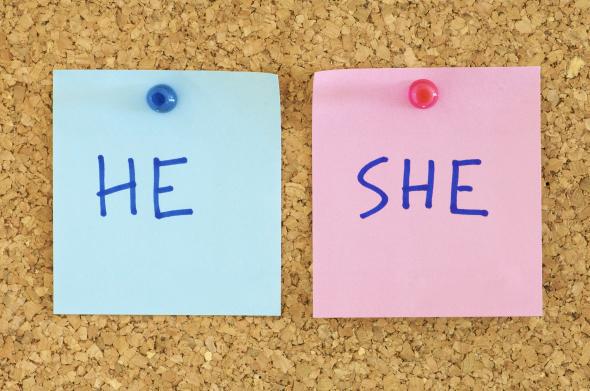Despite what you may have heard from both the extreme conservative and progressive sides of the debate, the adoption of gender-neutral pronouns—most often used in reference to trans and genderqueer people—is a complicated issue. The oversimplification on the right (assuming the “acceptance” non-binary gender identity in the first place) is that any adjustment to make language more accommodating is too much to ask. Meanwhile, on the far left you will find well-meaning but overzealous folks who call you a bigot for raising an eyebrow at mostly unknown and yet somehow suddenly publicly mandatory bespoke pronouns requested by individuals.
As a trans-supportive gay man, I live somewhere in the middle, which is why I sympathetically explored a blogger’s use of the pronoun ou a few months ago, hoping to explain the rationale behind “preferred gender pronouns” and to grapple with the productiveness of requests that go beyond switching his to hers. My basic, rather modest conclusion: Changing a deeply rooted aspect of language is hard, and acting like all petitions are equal is foolish; but with patience and a bit of strategic common sense, progress toward inclusivity is absolutely possible.
Much to my disappointment, that post did not go over well in some queer circles, which is why I was pleased to see Christen McCurdy’s excellent article soberly gaming out the prospects for gender-neutral pronouns in Pacific Standard last week. In her piece, McCurdy references “ou-gate” as her impetus for looking into linguistic and other scholarly work on the subject. What she finds is worth considering.
While some scholars point out that pronouns are the “most conservative” and therefore most unmalleable part of English, others argue that social conditioning and etiquette also play a role, such as when he was decreed by the British Parliament to be the generic third-person singular in official documents. Moreover, formal (mostly written) language seems more adaptable (see, for example, the relatively brisk change in news coverage of Chelsea Manning), while informal (mostly spoken) speech is more entrenched by power of habit and pattern. All of these points must be part of any honest discussion on the subject; however, I left the article feeling like they, despite the technically inaccurate number implied, has the best hope of general adoption, due to its familiarity and already common (if incorrect) use as a singular neutral pronoun in spoken English.
As our society becomes more aware of and sophisticated about trans and genderqueer identities, they seems like a good and reasonable place to start with gender-neutral pronouns. More elegant options may be devised and debated, but only those that take into account the communal nature of language can ever hope to be taken up widely. Otherwise, they risk the limitation of all bespoke objects: A user-base of one.
